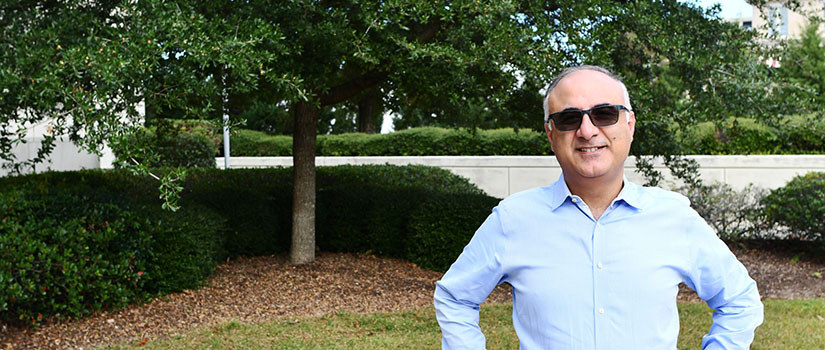As electrical engineering job opportunities continue to rise, student interest in this area is declining nationally. Electrical Engineering Distinguished Professor Adel Nasiri hopes to change that trend by showing students the career possibilities in this rapidly growing field.
“There is a dire need for more electrical engineers in today’s workforce due to increased demand for electrification, Nasiri says. “If you look around, we want everything to be electrified—vehicles, airplanes, ships, utilities, household equipment, thermal management and so on—and we have the technology to do that. It’s cleaner, more efficient, more flexible and consumers like it more.”
However, while the need for electrical engineers is increasing, the national trend points toward a drop in student enrollment in favor of other engineering specializations.
“For students coming from high school, electrical engineering coursework seems very difficult,” Nasiri says. “But there are a lot of concepts beyond math and physics and enormous job opportunity with versatility. Students often don’t see the possibility beyond the first couple of semesters, so we have to show them.”
Nasiri joined the College of Engineering and Computing faculty in August, bringing a host of impressive work from a 16-year career at the University of Wisconsin–Milwaukee (UWM). He served in various positions, including associate dean for research and director of many successful research programs. In 2011, he launched the Center for Sustainable Electrical Energy Systems (SEES) in UWM’s College of Engineering and Applied Sciences. Nasiri explains that the idea behind the center was to facilitate collaboration on multi-disciplinary projects in the general area of electrical and energy systems and generate visibility for this area of research.
“Wisconsin is a leader in energy and power, with a high concentration of leading companies operating in the electrical energy and power industry,” Nasiri says. “A main objective of the center is to actively contribute, through collaboration between academia and industry, to the area of advanced energy technologies.”
Nasiri also served as site director for the National Science Foundation’s Center on Grid-Connected Advanced Power Electronic Systems (GRAPES), an industry and university cooperative research center seeking to make electric power systems more sustainable, cost-effective and secure. According to Nasiri, GRAPES is the only center in the United States focused on grid-connected power electronics.
In 2017, Nasiri began building the concept for what became UWM’s Connected Systems Institute, serving as interim executive director. He led the campus effort to raise financial support and awareness for the institute, which garnered support from industry leaders including Rockwell Automation, Microsoft, Johnson Controls and ANSYS, with a focus on industrial Internet of Things (IoT). The institute serves as a test bed to conduct research, provide education and offer programs to develop talent, expertise and solutions for greater productivity through IoT technologies and applications.
But Nasiri began looking for a change after 16 years in Milwaukee. The energy program at the University of South Carolina, which he describes as one of the largest in the country with international foothold and recognition, was a big draw. “And you cannot deny the weather,” he says. “It would probably be difficult to retire in Milwaukee.”
Now that he is on campus, Nasiri is still learning about the CEC and brainstorming research ideas. One topic he is considering is resilient and intelligent energy systems, looking at all elements of an energy system including the component, interconnections, controls and data sharing to develop an energy system with increased efficiency and reliability. “This is an interdisciplinary concept that would require expertise from many areas,” Nasiri says. “Other areas of interest focus on three major topics: high power converters for energy systems, electrical energy storage and micro grids and their integration with the utility grid.”
Nasiri is a Distinguished Professor of Electrical Engineering and serves as chair of IEEE Industry Applications Society Committee on renewable and sustainable energy conversion and vice chair TC5 (sustainable energy systems) of the IEEE Power Electronics Society. His research interests are power electronics; distributed generations; microgrids; grid interface; resilient energy systems; energy efficiency; energy-water nexus; energy storage systems; interface and controls; data intensive energy systems; and smart and connected energy systems.
